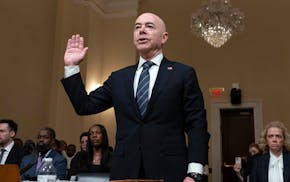Transit planners say delays in the Southwest Corridor light-rail project will likely push back its opening to 2019 or 2020 — a year or more beyond its scheduled start — and help push the price tag from $1.5 billion to as high as $1.8 billion.
The latest setback was revealed Wednesday at a meeting of metro leaders who are poised to make a recommendation on whether to hide the light-rail line in tunnels alongside freight trains in the Kenilworth corridor of Minneapolis or reroute the freight in St. Louis Park.
But there appeared to be little support outside of Minneapolis on Wednesday for rerouting the freight, an option that could delay the opening of the line even longer. Minneapolis officials have opposed one tunnel plan and expressed doubts about other tunnel options offered as a compromise.
"The city is not convinced that is … real," Peter Wagenius, top policy aide to Minneapolis Mayor Betsy Hodges, said afterward.
Wagenius said he didn't envision the city voting with the majority of the panel when it makes a recommendation next week to the Metropolitan Council, the agency planning the light-rail project from downtown to Eden Prairie.
The city's position foreshadows a likely showdown this spring involving Minneapolis, four other cities along the line and transit planners over the future of Southwest, the biggest light-rail project in the Twin Cities.
The Met Council transit planners told the metro leaders that delays would increase the costs of a tunnel option they recommended last fall from $1.55 billion to $1.6 billion and postpone the opening from 2018 to 2019.
That option was put on hold by Gov. Mark Dayton last October after Minneapolis officials opposed it.
Two alternatives involving tunneling under a water channel linking Lake of the Isles and Cedar Lake could bring the cost to $1.7 billion or higher and delay the opening to 2020.
Rerouting the freight in St. Louis Park and building the light-rail line at ground level in the Kenilworth corridor would also cost $1.7 billion, but the additional work needed would delay the project to 2021.
Planners are also under pressure to restore a station at the end of the line in Eden Prairie that had been dropped from plans last year to save money. If they did so, the most expensive options would increase to about $1.8 billion.
Tunnels supported
The extra time needed to engineer a St. Louis Park reroute for freight trains adds another negative element to that option. St. Louis Park officials and some residents strongly oppose the reroute, which would run more trains near their homes and past a school.
The Twin Cities & Western railroad says the latest reroute option is less safe and more costly than its current line through the Kenilworth corridor.
The railroad would have clout in whether the federal government approved a reroute, a process that could also delay construction.
"I don't see any chance of that proceeding," Minnetonka Mayor Terry Schneider told other metro leaders.
Jake Spano, the St. Louis Park's representative on the panel, later announced, "The reroute is off the table."
Last fall the metro leaders approved digging nearly half-mile-long tunnels on either side of the water channel with the light-rail trains surfacing for 360 yards to cross a bridge. Kenilworth corridor residents objected to the sight of 220 light-rail trains a day over the bridge and the city of Minneapolis opposed the tunnels, in part because of the disruption caused by construction.
The plan would contribute $160 million to the cost.
Schneider said that option should be reconsidered along with a new one: a single tunnel running six-tenths of a mile and under the water channel. Although that tunnel would be shorter, burrowing under the bottom of the channel would boost the tunnel costs from $160 million to $200 million. He said the planners shouldn't spend $245 million on a tunnel that would go under the channel and run 1.1 miles.
"We have a big decision to make next week," said Hopkins City Council Member Cheryl Youakim.
Bad faith in Minneapolis?
Asked after the meeting if the city might consider the new tunnel alternatives, Wagenius questioned the sincerity of the Met Council.
"We are not convinced this is a real thing," he said.
He noted that the Minneapolis Park and Recreation Board urged the Met Council to consider tunneling under the channel and that the board has the authority to challenge the project under federal environmental regulations.
"It seems to us it might be entirely for the purpose of anticipating a future … lawsuit from the park board," Wagenius said.
He said the Met Council first disclosed the new options for tunneling under the channel earlier this month to the park district and Hennepin County before telling Minneapolis two weeks ago. "No one has had enough time to evaluate," he said. "The city has had even less than others."
He said the City Council hasn't softened its stance of three weeks ago, when it passed a resolution favoring the freight reroute and opposing the two tunnels with a light rail bridge over the channel.
The Met Council is required under state law to ask the cities along the proposed route for their consent to plans.
Wagenius declined to say whether the city would deny consent to a tunnel or tunnels.
But asked if he thought it was likely the city would vote with the majority of metro leaders next week, he replied, "No."
Pat Doyle • 612-673-4504
Biden scores endorsements from Kennedy family, looking to shore up support against Trump and RFK Jr
New Black congressional district in Louisiana bows to politics, not race, backers say
Trump trial jury selection process follows a familiar pattern with an unpredictable outcome
Climate change concerns grow, but few think Biden's climate law will help, AP-NORC poll finds

![9:13 a.m. The train paused at Cedar Lake Ave. awaiting permission to proceed into Minneapolis. ] GLEN STUBBE * gstubbe@startribune.com Tuesday March 4](https://arc.stimg.co/startribunemedia/O2D3AG3OR3YK4DX2Z5DFRPGKCI.jpg?w=600&h=600&auto=format%2Ccompress&cs=tinysrgb)